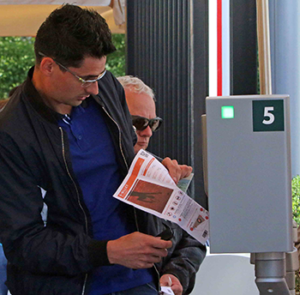By JOHN MARTIN
PARIS—As the French Open moves into its final weekend, its top officials are claiming near total suppression of illegal ticket sales.
After decades of arresting scalpers on the streets and skirmishing with them more recently in cyberspace, victory appears in sight.
“I think you can’t say you have won because you have to always be very humble” said Nathalie Sergent, director for ticketing, revenues, and sponsors. “What it is true is that around the stadium, we fight. I mean this is a fight we have won,” she said.
Paris police who patrol the avenues leading to the gates have reported a sharp drop in scalpers illegally buying and reselling tickets.
In 2010, the officers took 170 suspects into custody in 13 days, according to a report by Lt. Jean-Yves Hunault. This year, they arrested fewer than 20 suspects in the first 8 days.
At the same time, the federation and the police have flooded the avenues and metro station entrances with agents and young French Open information workers. Their presence discourages scalpers from trying to buy tickets from arriving spectators.
“People try to resell tickets but it’s quite difficult ” said Sergent, “It’s much more complicated.”
Technology also plays a central role.
”You have to register your name the day before or the day you come in the stadium,” said Francois L’Hospitalier, legal director of the French Tennis Federation.
“We make a kind of crosscheck when you enter in the stadium between your electronic ticket and your ID,” he said.
To assist its gate keepers, the federation installed about 30 laser-based ticket control machines at three major entry points. The machines scan each entrant’s paper ticket and issue a small card identifying the buyer’s correct name.
Spectators who can’t produce a matching ID card are blocked by gate attendants from entering the grounds. Violators cannot claim surprise. As they approach the gate, a loudspeaker warns: “If you buy tickets in the street, you may be refused entry to the grounds.”
The apparent turnaround in scalper suppression comes after years of frustration. Even after the federation inaugurated electronic ticketing in 2007, violators found ways around it.
In 2010, Frédéric Longuépée, then a deputy director, estimated that perhaps 30,000 tickets were disappearing each year into a secondary market tapped by illegal scalpers and legal sales agents.
The struggle over these seats stretched beyond Paris.
“You have something like more than 100 Web sites,” said Longuépée, whose responsibility was ticketing and corporate hospitality.
All were aimed at selling tickets “they don’t have,” he said.
“They don’t have because we sell them,” he said.
The federation went on the offensive to protect the 460,000 seats it manages for the two-week championship.
First, it sued e-Bay and won a court order barring the service from offering French Open tickets for resale in France.
Then It lobbied the French Chamber of Deputies to make scalping a felony and to increase fines to15,000 euros (about $17,000). Repeat offenders now face a double fine of 30,000 euros/
The illegal sales continued.
Longuepee was exasperated.
“I mean, this is my nightmare,” he said. “I hate these people.”
Then, last year, according to L’Hospitalier, the federation invented a solution he called “unique and efficient.”
It began requiring people to provide identification that matches the buyer’s name, which is contained in the ticket’s bar code scanned at the gate.,
“It’s much easier for us now because of the barrier,” said Berengere Rieu, the federation’s Joint Director for Safety.
As a result, said Sergent and L’Hospitalier, the French Open software that blocks imposters from crashing the gates at Roland Garros is now under study by major professional sports teams plagued by scalpers in France.
“So,” asked a reporter, “this is victory?”
“Yes,” said Director Sergent, “we can say so.”
